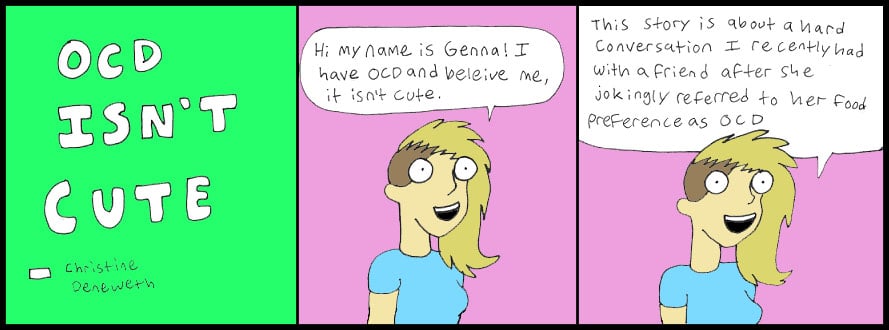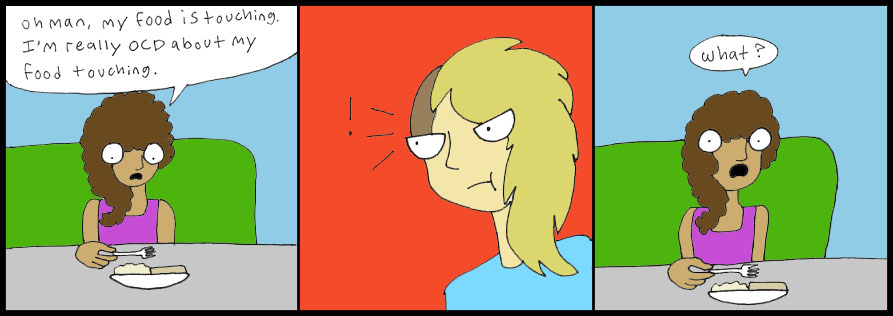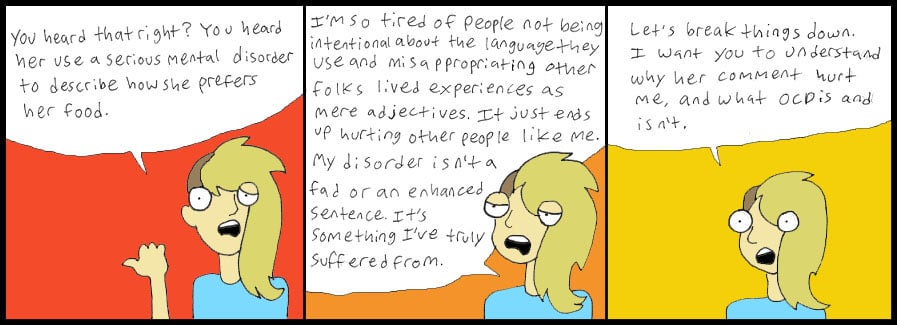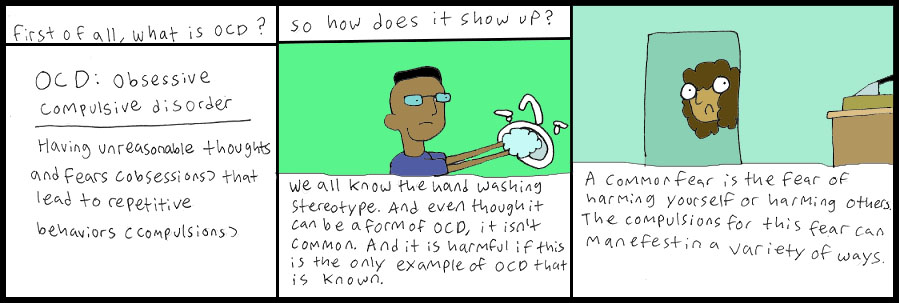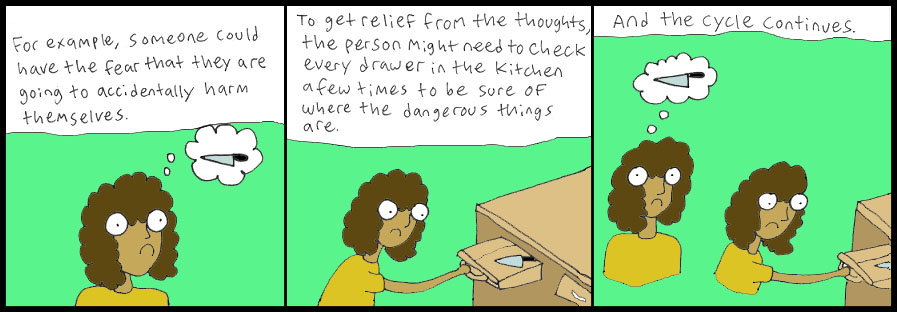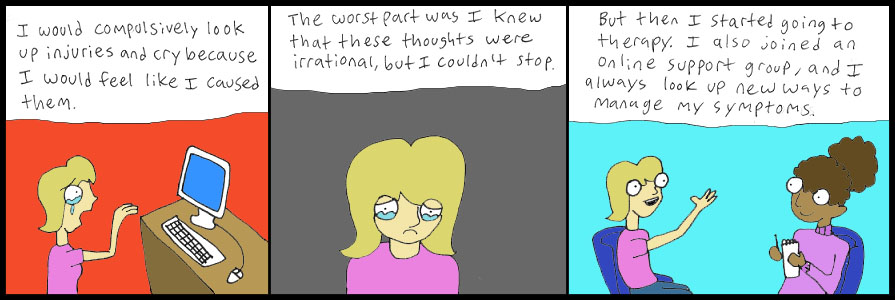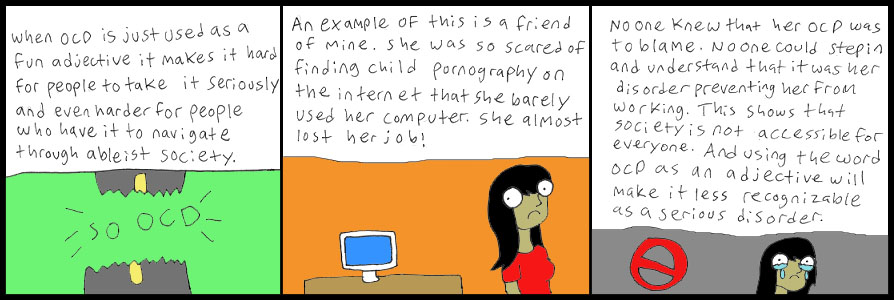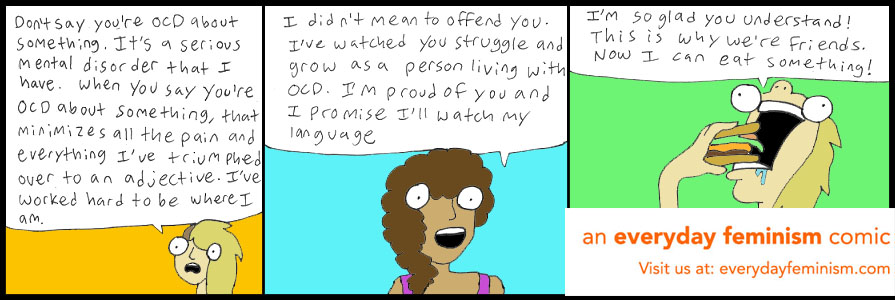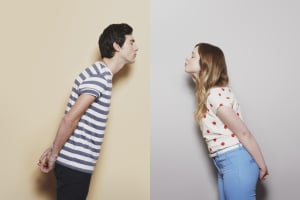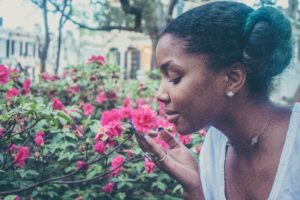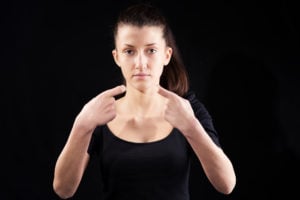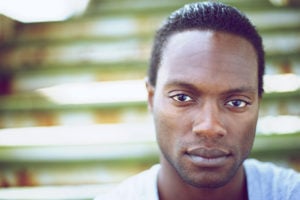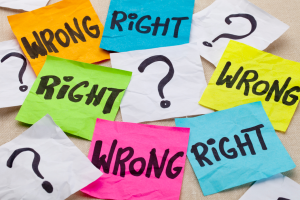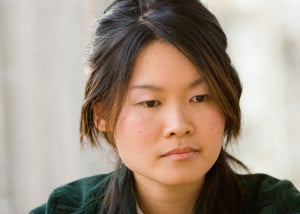Panel 1
Text: OCD Isn’t Cute – Christine Deneweth
Panel 2
Genna talking and smiling. She has one side of her head shaved, the other side is long hair.
Genna: Hi my name is Genna. I have OCD, and believe me, it isn’t cute.
Panel 3
Genna talking and smiling.
Genna: This story is about a hard conversation I had with a friend after she jokingly referred to her food preferences as OCD.
Panel 4
Genna sitting with her friend Marina. Marina is in a tank top with long curls over her shoulder.
Text: I had already told her about how hard it is to have OCD at times, so it really set me off when she used the term so carelessly.
Panel 5
Waitress appears with food.
Waitress: Here we are ladies! Enjoy!
Panel 6
Close up of steak and mashed potatoes.
Panel 7
Marina looking at her food.
Marina: Oh man, my food is touching. I’m really OCD about my food touching.
Panel 8
Genna looking up angrily.
Genna: !
Panel 9
Marina looking at Genna.
Marina: What?
Panel 10
Genna looking out at the audience and pointing at Marina.
Text: You heard that, right? You heard her use a serious mental disorder to describe how she prefers her food.
Panel 11
Genna talking with her eyes narrowed.
Genna: I’m so tired of people not being intentional about the language they use and misappropriating other folks’ lived experiences as mere adjectives. It just ends up hurting people like me. My disorder isn’t a fad or an enhanced sentence. It’s something I’ve truly suffered from.
Panel 12
Genna talking.
Genna: Let’s break things down. I want you to understand why her comment hurt me, and what OCD is and isn’t.
Panel 13
Text First of all, what is OCD?
Text: OCD: Obsessive Compulsive Disorder
Text Having unreasonable thoughts and fears (obsessions) that lead to repetitive behaviors (compulsions).
Panel 14
Man washing his hands.
Text: So does it show up?
Text: We all know the hand washing stereotype. And even though it can be a form of OCD, it isn’t as common. And it is harmful if this is the only example of OCD that is known.
Panel 15
Women looking into a kitchen at knife.
Text: A common fear is the fear of harming yourself or harming others. The compulsions for this fear can manifest in a variety of ways.
Panel 16
Woman thinking about knife.
Text: For example, someone could have the fear that they are going to accidentally harm themselves.
Panel 17
Woman opening drawer.
Text: To get relief from the thoughts, the person might need to check every drawer in the kitchen a few times to be sure of where the dangerous things are.
Panel 18
Woman thinking about knife and checking drawer
Text: And the cycle continues.
Panel 19
Genna thinking about a knife.
Text: I, personally, have the fear of harming others.
Panel 20
Genna as a doctor with a patient.
Text: I wanted to be a doctor when I grew up. But my OCD started to take over when I was ten, and it took that dream away.
Panel 21
Young Genna holding a book. She has short hair that curves up at the ends.
Text: In middle school, I was too scared to make friends. I thought I was bad for having these bad thoughts and that I didn’t deserve friends.
Panel 22
Young Genna crying at her computer.
Text: I would compulsively look up injuries and cry because I would feel like I caused them.
Panel 23
Young Genna crying and looking down.
Text: The worst part was I knew that these thoughts were irrational, but I couldn’t stop.
Panel 24
Young Genna talking to a therapist.
Text: But then I started going to therapy. I also joined an online support group, and I always look up new ways to manage my symptoms.
Panel 25
Text: So now that we know that OCD is, here’s what it isn’t:
Text: I’m so OCD! I’m OCD about that! That non-symmetry is freaking out my OCD!
Panel 26
Girl with a book.
Text: OCD is not an adjective! It is thrown around to describe someone that is tidy and organized.
Girl: I’m so OCD about how I organize my books.
Panel 27
Woman with knife thoughts and Man with hand washing OCD frowning.
Text: This trivializes and undermines people that have the disorder. It makes something that people are truly suffering from a fad or an enhanced sentence.
Panel 28
The words “So OCD” breaking a road in half
Text: When OCD is just used as a fun adjective, it makes it hard for people to take it seriously and even harder for people who have it to navigate through ableist society.
Panel 29
Girl with long black hair scared of computer.
Text: An example of this is a friend of mine. She was so scared of finding child pornography on the Internet that she barely used her computer. She almost lost her job!
Panel 30
Girl with long black hair crying.
Text: No one knew that her OCD was to blame. No one could step in and understand that it was her disorder preventing her from working. This shows that society is not accessible to everyone. And using OCD as an adjective will make it less recognizable as a serious disorder.
Panel 31
Marina looking at her food.
Text: Which reminds me…
Marina: Oh man, my food is touching. I’m really OCD about my food touching.
Panel 32
Genna talking.
Genna: I should talk to her. It’s not like she’ll know she did something wrong without me saying something.
Panel 33
Genna talking to Marina.
Genna: Hey, Marina?
Marina: What?
Panel 34
Genna talking.
Genna: Don’t say you’re OCD about something. It’s serious mental disorder that I have. When you say you’re OCD about something, that minimizes all the pain and everything I’ve triumphed over to an adjective. I’ve worked hard to be where I am.
Panel 35
Marina talking.
Marina: I didn’t mean to offend you. I’ve watched you struggle and grow as a person living with OCD. I’m proud of you, and I promise I’ll watch my language.
Panel 36
Genna talking and stuffing her face with a sandwich.
Genna: I’m so glad you understand. This is why we’re friends. Now I cane eat something!


